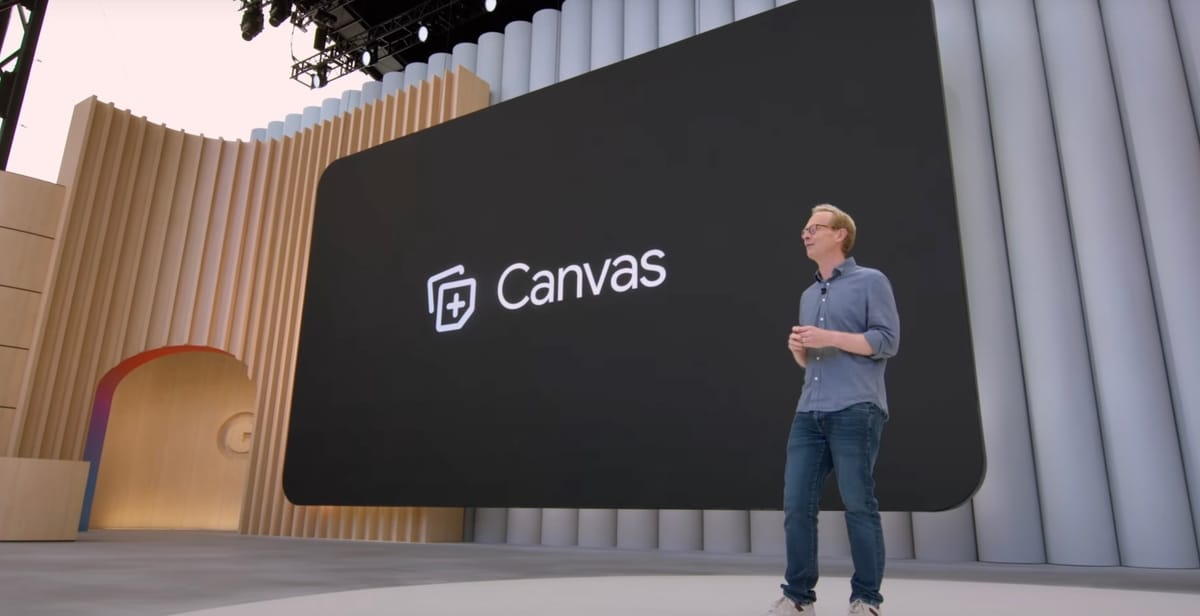
Google has supercharged Canvas with its latest Gemini 2.5 models, turning what was already an impressive interactive space into a full-fledged creation platform that can transform documents and code into shareable applications, podcasts, and more.
Key Points:
- Canvas, powered by Gemini 2.5, can transform written reports into dynamic web pages, infographics, quizzes, and podcasts in 45 languages.
- "Vibe-coding" allows you to simply describe an idea and generate working code for apps and games.
- The upgraded Canvas is accessible to all Gemini users, with Pro and Ultra subscribers getting the beefier Gemini 2.5 Pro and a larger context window.
When Google first introduced Canvas back in March, it was a promising new feature in the Gemini app for refining documents and code. Yesterday at Google I/O 2025, the company revealed how dramatically Canvas has evolved, now powered by their flagship Gemini 2.5 models.
On stage, Josh Woodward, VP of Google’s Labs group, demonstrated Canvas's new capabilities. "Canvas will now let you transform that report with one tap into all kinds of new things, like a dynamic web page, an infographic, a helpful quiz, even a custom podcast in 45 languages," Woodward explained.
But where Canvas truly shines is in its "vibe coding" capabilities with Gemini 2.5 Pro, allowing you to build interactive web applications through natural conversation with the AI. The model's enhanced coding abilities, which recently topped the WebDev Arena leaderboard, enable users to create functional applications without writing a single line of code themselves.
Woodward emphasized the back-and-forth nature of it, letting you refine and tweak as much as you need. “This is the power to transform anything,” he said, “and it’s a whole new way to use Gemini.” Suddenly, that barrier to creating software or just rapidly prototyping an idea feels a whole lot lower.
In a live demonstration, Tulsee Doshi, a product lead at Google, showcased how she transformed a rough sketch into a fully-functional 3D web application for a museum exhibit. The entire process took just minutes, with Gemini interpreting her drawings and ideas, then generating the necessary Three.js code to bring it to life.
"I know it would have taken forever to do this by hand," Doshi said after creating a complex 3D animation based on a simple sketch. "Instead, I was able to create this just based on a sketch."
The best part is that your creations don't live in isolation. "After you create an app using vibe-coding techniques, you can share it with others who can easily jump in and view it and modify it and remix it," Woodward explained. "This is the power to transform anything, and it's a whole new way to use Gemini."
By eliminating the need for specialized coding knowledge, Google is making app development more accessible to almost anyone with an idea. A marketing professional could create an interactive product demo, a teacher could build a custom educational game, or a small business owner could develop a functional prototype to test concepts with customers.
For students, Canvas offers a particularly compelling toolkit. You can upload study guides and sources, then have Gemini create custom quizzes to assess their understanding. Moreover, these quizzes can even be shared with friends and family, transforming passive review into engaging learning experiences.
The business applications are equally impressive. Organizations can use Canvas to quickly develop custom dashboards for team tracking, customer management systems, and sales pipelines without traditional development resources.
All these updates are now available as part of the broader rollout of features announced at I/O. Canvas is accessible to all Gemini users, though Google AI Pro and Ultra subscribers gain access to the more powerful Gemini 2.5 Pro model with its million-token context window for more complex projects.
It's worth noting that there are some limitations for Google Workspace business and education users — they cannot share content created in Canvas, though they can view links shared by personal account users. Additionally, apps that include Workspace data cannot be previewed.
This is not to say it’s all sunshine and instant app generation, of course. The reality of vibe-coding is that it will likely involve a fair bit of iteration (and perhaps some hair-pulling) when the AI doesn’t quite nail what you want.
Still, the ambition is palpable. Google is clearly pushing Gemini app beyond a simple conversational assistant and into a realm of active co-creation. Woodward's enthusiasm was infectious when he talked about sharing these vibe-coded apps, allowing others to "jump in and view it and modify it and remix it." If it can deliver on its promise, Canvas (and tools like it) could drastically change how we think about bringing digital ideas to life. Now, if you'll excuse me, my kids have an idea for a cat-themed planet generator I need to try out.

